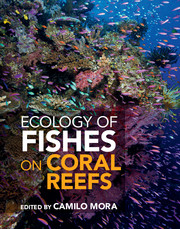Book contents
- Frontmatter
- Contents
- Preface
- Foreword
- List of contributors
- PART I BASIC ECOLOGY
- PART II PATTERNS AND PROCESSES
- PART III HUMAN FINGERPRINTS
- PART IV CONSERVATION
- 18 Resilience in reef fish communities
- 19 Phase shifts and coral reef fishes
- 20 Extinction risk in reef fishes
- 21 A perspective on the management of coral reef fisheries
- 22 Linkages between social systems and coral reefs
- PART V DEBATES AND PARADIGM SHIFTS
- References
- Index
21 - A perspective on the management of coral reef fisheries
from PART IV - CONSERVATION
Published online by Cambridge University Press: 05 May 2015
- Frontmatter
- Contents
- Preface
- Foreword
- List of contributors
- PART I BASIC ECOLOGY
- PART II PATTERNS AND PROCESSES
- PART III HUMAN FINGERPRINTS
- PART IV CONSERVATION
- 18 Resilience in reef fish communities
- 19 Phase shifts and coral reef fishes
- 20 Extinction risk in reef fishes
- 21 A perspective on the management of coral reef fisheries
- 22 Linkages between social systems and coral reefs
- PART V DEBATES AND PARADIGM SHIFTS
- References
- Index
Summary
Fisheries on coral reefs provide food, employment, recreation, and cultural identity for hundreds of millions of people around the world. The complex nature of these fisheries means that the vast majority are either unmanaged or undermanaged, and most go un assessed. Fisheries management relies on controlling fishing effort (e.g. seasonal and area closures, gear restrictions, limited entry) and/or catch (e.g. bag and size limits, catch quotas) and many of these measures have been practiced in various forms for thousands of years by indigenous peoples. Standard techniques and assumptions in use today have been developed primarily for large-scale industrial fisheries targeting relatively few species, leaving most coral reef fisheries with little or no scientific advice to guide management decisions. The lack of even the most basic knowledge on catch and effort in all but a few of these fisheries makes harvest controls impractical except for a small number of select and valuable single species fisheries. Spatial management, in the form of MPAs, customary marine tenure, and more comprehensive marine zoning, along with restrictions on destructive and overly efficient fishing gear holds the greatest promise for reversing the decline in coral reef fisheries and the associated ecosystem. There is an urgent need to reform coral reef management and focus on the resilience of coral reefs as linked social–ecological systems.
Coral reef fisheries are extremely complex, with hundreds of species targeted by myriad gear types with numerous landing sites and distribution channels [1808]. The multispecies, multi-gear nature of these fisheries presents a number of management challenges, particularly in developing countries where most of these fisheries occur [1621]. In addition, the high biodiversity value of coral reefs means that the goals of sustainable fisheries are often at odds with maintaining ecosystem function and viability [198].
Fisheries on coral reefs run the gamut from fully commercial to purely subsistence, with many fishers participating in multiple sectors of these fisheries, often at the same time [609,1179,2007].
- Type
- Chapter
- Information
- Ecology of Fishes on Coral Reefs , pp. 208 - 214Publisher: Cambridge University PressPrint publication year: 2015
- 8
- Cited by



